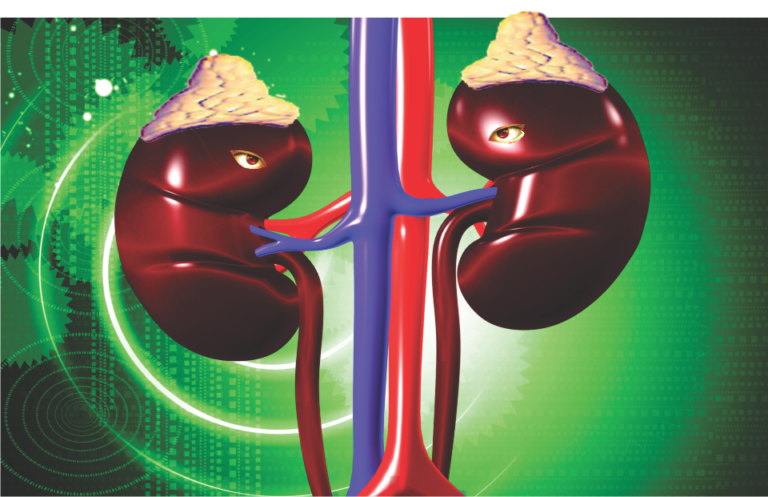Too little attention is paid today to a couple of small glands called the “Adrenals”. The adrenals are responsible for a multitude of critical functions in the body and when they are not working up to par, many systems are impaired. The adrenals are a part of a complex system of hormone-producing glands that control nearly every metabolic function in the body. This system, the Endocrine System, is a complex, interdependent, organized system, that has an intricate feedback response to any chemical changes in the body.
The adrenals (aka supra-renals – because they sit on top of the kidneys) are small, yet powerful little guys! They are separated into 2 structures, the adrenal cortex and medulla. Each produce hormones critical for function, especially in response to stress. The adrenal cortex mainly produces or synthesizes corticosteroid hormones such as cortisol, corticosterone and androgens (testosterone, DHEA and aldosterone). It is regulated by hormones secreted by the pituitary and hypothalamus.
The adrenal medulla mostly produces epinephrine (adrenaline) and norepinephrine (noradrenaline) which are important catecholamines necessary for the fight-or-flight (or stress) response. It is controlled by the sympathetic nervous system.
This complexity of hormones control many systems such as response to stress or danger, sustained energy, blood pressure, blood sugar levels, inflammation, mineral salt regulation and sex hormones. In fact, when a woman is menopausal, it is the adrenal glands that become the major source of circulating sex hormones. It is the adrenals job to regulate how well you respond to stress. The more stressed the adrenals become, the less capable of handling stress you become. According to Dr. James L. Wilson, (coined the term “adrenal fatigue”), “…how well you live depends a great deal on how well your adrenal glands function.”
“Adrenal Fatigue” is not a conventional medical diagnosis, nor a medically-accepted condition. It is not adrenal failure (Addison’s Disease), it is sub-optimal adrenal function – the gray area between good function and failure. True medical adrenal insufficiency can be a serious, life-threatening disorder. That is not what we are talking about here. We are referring to that gray area.
There are many things that affect adrenal function. Stress is number one. The adrenals were designed for a once-in-awhile great burst of cortisol and adrenaline when danger presents itself (fight-or-flight response). The body goes into action, then, when all is safe, everything gets restored back to “normal”. No harm done (hopefully!). However, stress is a chronic, long term fight-or-flight response. A chronic, unrelenting series of adrenaline and cortisol bursts .
Cortisol is one of the hormones secreted by the adrenals. It is both a good hormone and a “bad” hormone, depending upon its release. Sustained low levels of Cortisol is beneficial. It is converted, in a sense, to cortisone, the body’s natural anti-inflammatory hormone. But when it surges, as it does in a fight-or-flight response or in excess intake of sugar, it is now harmful. It becomes pro-inflammatory and tells the body to store more belly fat.
When your adrenals are stressed, your body has a difficult time responding and adapting properly to emotional and physical stresses. You feel fatigued, sleep is unrestful, you tend to gain weight and can’t seem to lose it and more.
©2011 Holly A. Carling, O.M.D., L.Ac., Ph.D.







